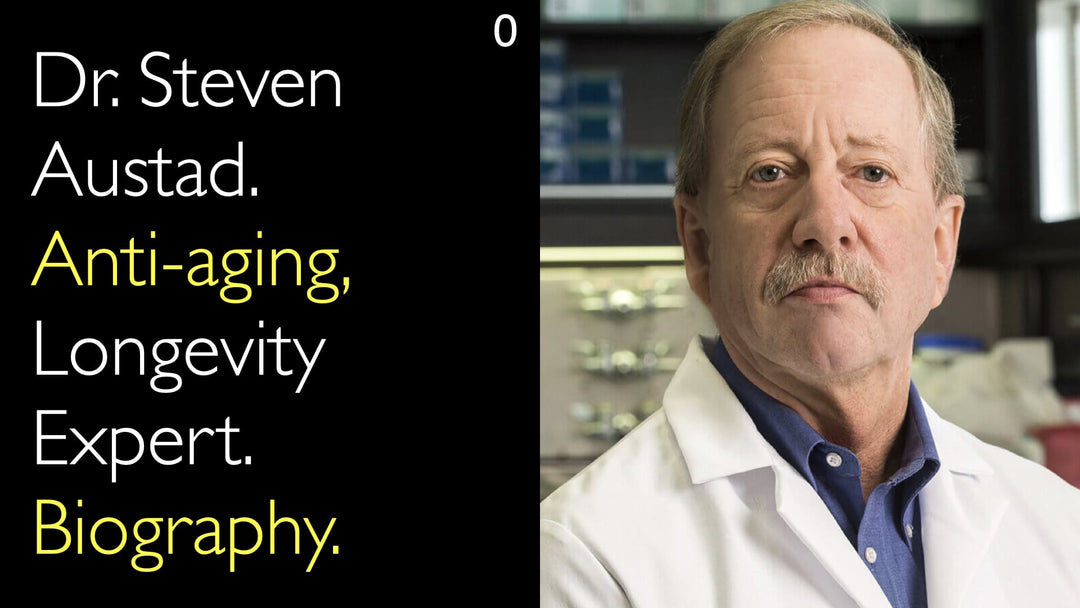Leading expert in aging and longevity research, Dr. Steven Austad, MD, PhD, explains the biological mechanisms of aging. He discusses his work at the University of Alabama at Birmingham and the American Federation for Aging Research. Dr. Austad explores pharmaceutical interventions to slow aging. He also shares insights from his research on long-lived animal species. The goal is to extend human healthspan and combat age-related diseases.
Understanding the Biology of Aging and Strategies for Longevity
Jump To Section
- Expert Background and Research Focus
- Key Mechanisms of the Aging Process
- Pharmaceutical Interventions to Slow Aging
- Lessons from Long-Lived Animal Species
- Major Aging Research Initiatives and Centers
- Future Directions in Longevity Science
- Full Transcript
Expert Background and Research Focus
Dr. Steven Austad, MD, PhD, is a distinguished professor and researcher in the field of biogerontology. He holds the Protective Life Endowed Chair in Healthy Aging Research at the University of Alabama at Birmingham. Dr. Austad's primary research objective is to understand the fundamental biological processes that drive aging. His work aims to develop interventions that can delay the onset of age-related health decline.
Dr. Anton Titov, MD, engages with Dr. Austad to explore the practical implications of his research for human health. Dr. Austad's extensive publication record includes over 200 scientific papers on aging. He has also authored influential books that translate complex aging science for the public.
Key Mechanisms of the Aging Process
Aging research has identified several primary biological mechanisms that contribute to functional decline. These include cellular senescence, mitochondrial dysfunction, and genomic instability. Dr. Steven Austad, MD, PhD, studies how these processes interact across different tissues and organ systems. His research examines why some species age much more slowly than others.
Understanding these fundamental mechanisms provides targets for potential interventions. Dr. Austad's work helps bridge the gap between basic biology and clinical applications. This research approach offers hope for addressing multiple age-related conditions simultaneously.
Pharmaceutical Interventions to Slow Aging
Dr. Steven Austad, MD, PhD, investigates pharmaceutical methods to target the biological pathways of aging. These interventions aim to delay the onset of age-related diseases rather than treating them individually. The approach represents a paradigm shift from disease-specific treatment to targeting aging itself.
Several compounds show promise in preclinical models for extending healthspan. These include rapamycin analogs, metformin, and senolytics. Dr. Austad's research contributes to understanding how these compounds might be safely applied in humans. The goal is to develop therapies that maintain physical and cognitive function later into life.
Lessons from Long-Lived Animal Species
Comparative biology provides crucial insights into aging mechanisms and longevity strategies. Dr. Steven Austad, MD, PhD, studies exceptionally long-lived animal species in their natural environments. His book "Methuselah's Zoo" explores what humans can learn from nature's most longevity-adapted creatures.
Species like naked mole rats, bowhead whales, and certain tortoises exhibit remarkable resistance to age-related decline. These animals have evolved unique cellular repair mechanisms and maintenance systems. Understanding these natural models of extended healthspan could inform human therapeutic development. Dr. Austad's research translates these biological insights into potential human applications.
Major Aging Research Initiatives and Centers
Dr. Steven Austad, MD, PhD, plays a leadership role in several major aging research organizations. He serves as Scientific Director of the American Federation for Aging Research. This organization supports innovative research on aging processes and age-related diseases.
Dr. Austad also directs the NIH-sponsored Nathan Shock Center of Excellence in the Basic Biology of Aging. This center provides critical resources and infrastructure for aging researchers nationwide. Additionally, he serves on the Executive Committee of the National Institute on Aging Research Centers Collaborative Network. These initiatives accelerate progress in understanding and addressing the challenges of human aging.
Future Directions in Longevity Science
The field of aging research is rapidly advancing toward clinical applications. Dr. Steven Austad, MD, PhD, discusses emerging technologies and approaches that show promise for extending human healthspan. These include gene therapies, epigenetic reprogramming, and targeted senolytic compounds.
Dr. Anton Titov, MD, explores with Dr. Austad the ethical considerations and practical implementation of longevity interventions. The conversation addresses how these advances might be integrated into clinical practice. Both researchers emphasize the importance of maintaining quality of life while extending lifespan. The ultimate goal is to compress morbidity and preserve functional capacity throughout the lifespan.
Full Transcript
Dr. Anton Titov, MD: Hello from New York, we are with Dr. Steven Austad. We will discuss aging.
Dr. Austad is a Distinguished Professor and Protective Life Endowed Chair in Healthy Aging Research of the Department of Biology at the University of Alabama at Birmingham. He is the scientific director of the American Federation for Aging Research.
Dr. Austad also directs the NIH-sponsored Nathan Shock Center of Excellence in the Basic Biology of Aging. He also serves on the Executive Committee of the National Institute on Aging Research Centers Collaborative Network.
Dr. Austad is a fellow of the American Association for the Advancement of Science. He is also a fellow of the Gerontological Society of America. He has received multiple prestigious awards for his research work.
Dr. Austad seeks to understand the underlying causes of aging. His goal is to develop pharmaceutical methods that slow age-related health problems.
Dr. Steven Austad has published more than peer-reviewed journals. Dr. Austad's book, "Why Do We Age? What Science Is Discovering About the Body's Journey Through Life," has been translated into at least eight languages.
His new book is "Methuselah's Zoo: What Nature Can Teach Us About Living Longer and Healthier Lives." It will be released by MIT Press in 2022.
Dr. Anton Titov, MD: Dr. Austad, hello and welcome.
Dr. Steven Austad, MD: Thank you. It's very nice to be here.




